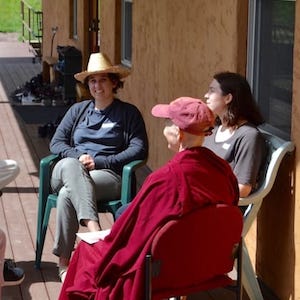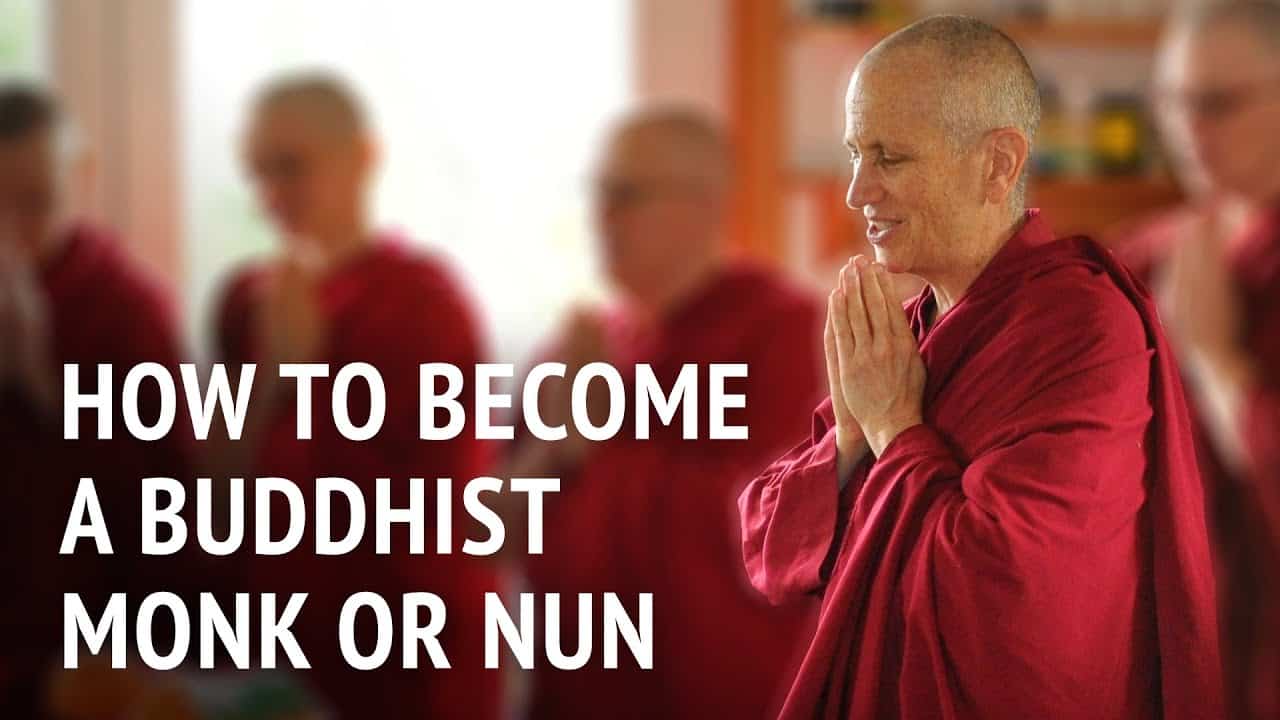The benefits of living as a monk or nun
In these interviews, recorded by a team from studybuddhism.com, Venerable Thubten Chodron answers questions about her life and what it means to be a Buddhist in the 21st century.
There are many benefits to becoming a Buddhist monk or nun.
It starts with having your motivation very clear, and that clarity and the motivation that makes you decide to ordain really prevents all this kind of confusion that people have nowadays. Should I do this? Should I do that? Should I go here? Should I go there? This massive confusion.
Your mind has to be in the right state to do this, to generate that motivation that says the Dharma is the most important thing in my life, and to put the Dharma central in my life, I need to create that space and create that lifestyle. The precepts give you that structure in your life.
You’ve realized, “I’ve seen a lot of entertainment, I’ve seen sports games, I’ve been here and been there, okay, now I’m done with that.” Instead of continuing to do those things, I’m going to really focus my life on the Dharma.
So I see ordination as a commitment to the Dharma, and then by taking the precepts, the first benefit is the lifestyle that you assume. The precepts create that lifestyle. And by keeping the precepts, every moment you’re not transgressing them, you’re creating virtuous karma.
Virtuous karma is clearly something that’s very important: it’s the cause of all happiness now and also the happiness of liberation and awakening. Every moment that you’re keeping each one of the precepts, you’re creating the virtue of keeping that precept. It’s a very powerful way to to create merit.
The precepts also help you to purify, because you’ve done a lot of reflection and you’ve seen your bad habits very clearly, and how your mind goes out of control. You’ve made some very firm decisions about how you want to be in the world, and how you don’t want to be in the world. This is based from your own experience, from your own wisdom. You’re voluntarily taking the precepts.
Things that you used to get involved in before that created so much negativity, now you’re saying, “I’m not going to do that.” And the power of the precepts is very strong, because then when you encounter situations where your old habit patterns could easily arise and take you down that slippery slope, you remember, “Oh, I have the precepts!” And these are the precepts that the Buddha himself kept.
So I’ve already made that decision that I’m not going to get involved in that kind of behavior, and then you just don’t. And your heart is completely at peace with it, because you know you’ve thought about the situation before. That’s what made you take the precepts.
The precepts also remove so much distraction from practice. I think having a family, living as a lay practitioner—I really admire the people who could do that. I just know for myself it would be very hard to have a husband and to have kids.
If I had a husband and kids I probably wouldn’t be sitting here right now doing this interview, because my husband would want to go traveling or do something with me, and my kids would want to do something else, and I wouldn’t have the time and space and freedom to go teach where I wanted to teach, to study the Dharma topics I wanted to study, to go on retreat, just to structure my life around the Dharma, because the needs of the family are so strong.
Not only the emotional needs of the family, but then you have to go to work and provide for the family, then there are always family crises you have to take care of, and it takes a lot of time and energy.
For me, I felt that becoming a monastic just cleared away a lot of distraction. It’s very helpful. The monastic life is not for everybody, but I think for the people it is suited for, it’s really a wonderful lifestyle.
Venerable Thubten Chodron
Venerable Chodron emphasizes the practical application of Buddha’s teachings in our daily lives and is especially skilled at explaining them in ways easily understood and practiced by Westerners. She is well known for her warm, humorous, and lucid teachings. She was ordained as a Buddhist nun in 1977 by Kyabje Ling Rinpoche in Dharamsala, India, and in 1986 she received bhikshuni (full) ordination in Taiwan. Read her full bio.


